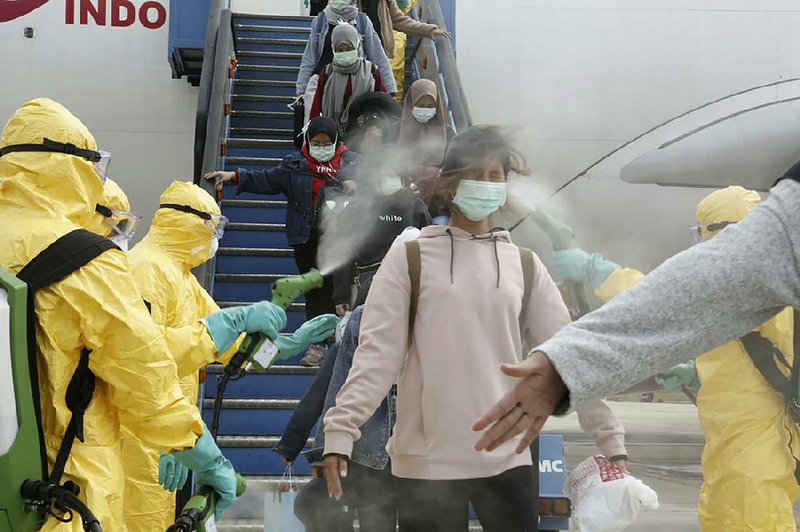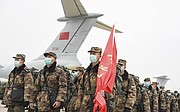BEIJING -- China sent medical workers and equipment today to its just-completed 1,000-bed hospital for treating victims of a new virus that has caused more than 17,000 infections at home and abroad.
Chinese authorities also delayed the reopening of schools in the hardest-hit province and tightened the quarantine in one city by allowing only one family member of each household to venture out to buy supplies, while criticizing other countries that imposed tighter travel restrictions.
The death toll in China climbed by 45, to 361, and the number of cases worldwide surged past 17,205, according to China's National Health Commission and other nations. The vast majority of those infected are in China; about 150 cases have been reported in two dozen other countries. The first coronavirus death outside China was recorded Sunday in the Philippines.
The Philippine Health Department said a 44-year-old Chinese man from Wuhan, the city at the center of the crisis, was hospitalized Jan. 25 with a fever, cough and sore throat and died after developing severe pneumonia. The man's 38-year-old female companion, also from Wuhan, tested positive for the virus as well and remained hospitalized in isolation in Manila.
[Video not showing up above? Click here to view » https://www.youtube.com/watch?v=2XZRgH3mg_Q]
Philippine President Rodrigo Duterte approved a ban on the entry of all noncitizens from China. The U.S., Japan, Singapore and Australia have imposed similar restrictions.
The U.S. on Sunday reported its ninth case, this one involving a woman in the San Francisco Bay Area's Santa Clara County who arrived in the U.S. to visit family after recently traveling to Wuhan.
Medical teams from the People's Liberation Army continued to arrive in Wuhan to relieve the city's overwhelmed health workers and to work at the new hospital, which opened just 10 days after construction began. A second hospital with 1,500 beds is under construction.
"This is the latest development in the Chinese people's critical battle against the novel coronavirus outbreak," the official Xinhua News Agency said in an article that presented leader President Xi Jinping as "commanding this fight" against the coronavirus outbreak.
Also, six officials in the city of Huanggang, next to Wuhan in Hubei province, were fired over "poor performance" in handling the outbreak, the official Xinhua News Agency reported. It cited the mayor as saying the city's "capabilities to treat the patients remained inadequate and there is a severe shortage in medical supplies such as protective suits and medical masks."
The trading and manufacturing center of Wenzhou, with nearly 10 million people in coastal Zhejiang province, confined people to their homes, allowing only one family member to venture out every other day to buy necessary supplies. Huanggang, home to 7 million people, imposed similar measures on Saturday.
With no end in sight to the outbreak, authorities in Hubei and elsewhere have extended the Lunar New Year holiday break, due to end this week, well into February to try to keep people at home and reduce the spread of the virus. All Hubei schools are postponing the start of the new semester until further notice.
Wenzhou, situated about 500 miles from Wuhan, put off the reopening of government offices until next Sunday, businesses until Feb. 17 and schools until March 1. The city has reported 241 confirmed cases of the virus, one of the highest levels outside Hubei.
Similar measures have been announced in the provinces and cities of Heilongjiang, Shandong, Guizhou, Hebei and Hunan, while the major cities of Shanghai and Beijing have also closed schools and public offices indefinitely.
TRAVEL RESTRICTED
Despite its own drastic travel restrictions, China has chafed at those imposed by foreign governments, criticizing Washington's order barring entry to most noncitizens who visited China in the past two weeks. Apart from damaging China's international reputation, such steps could worsen a domestic economy already growing at its lowest rate in decades.
The crisis is the latest to confront Xi, who has been beset by months of anti-government protests in Hong Kong, the reelection of Taiwan's pro-independence president and criticism over human-rights violations in the traditionally Muslim territory of Xinjiang.
New Zealand announced Sunday it is temporarily barring travelers from China to protect the South Pacific region from the virus. The 14-day ban applies to foreigners leaving China but not to New Zealand residents. New Zealand also raised its travel advice for China to "Do not travel," the highest level.
Qatar Airways joined the growing number of airlines suspending flights to mainland China. Indonesia and Oman also halted flights, as did Saudi Arabia's flagship national carrier, Saudia.
Saudi Arabia's state-run media reported that 10 Saudi students were evacuated from Wuhan on a special flight. It said the students would be screened on arrival and quarantined for 14 days.
Over the weekend, South Korea and India flew hundreds of their citizens out of Wuhan. A Turkish military transport plane carrying 42 people arrived in Ankara on Saturday night. A French-chartered plane made its way toward France on Sunday with 300 evacuees from a multitude of European and African countries. And Morocco flew home 167 of its people, mostly students.
Indonesia flew back 241 citizens from Wuhan on Sunday and quarantined them on the remote Natuna Islands for two weeks. Several hundred residents protested the move.
Vietnam counted its seventh case, a Vietnamese-American man who had a two-hour layover in Wuhan on his way from the U.S. to Ho Chi Minh City. The country ordered schools to close for at least a week in 19 of its 54 provinces and cities, including Hanoi and Ho Chi Minh City, which together account for over 4 million students.
Europe so far has 25 people infected with the virus. The German Red Cross reported two more cases there on Sunday, both German citizens who were airlifted from Wuhan on Saturday on a military transport carrying 128 people. Eight earlier cases in Germany were all linked to an auto parts factory.
France has six cases; Russia, Italy and Britain have two each, and Finland, Sweden and Spain each have one.
German Health Minister Jens Spahn said he had spoken to his U.S. counterpart and agreed that the Group of Seven health ministers should hold a teleconference on how to coordinate efforts against the coronavirus.
"It doesn't help if one country alone takes measures, and certainly not in Europe," Spahn said. The other G-7 members are France, Italy, Japan, Canada and Britain.
[Gallery not loading above? Click here for more photos » arkansasonline.com/23outbreak/]
MORE TRANSPARENCY
The Trump administration's national security adviser, Robert O'Brien, said on CBS' Face the Nation that the Chinese so far "have been more transparent certainly than in past crises and we appreciate that and we continue to offer assistance to the Chinese."
"Right now, there's no reason for Americans to panic," he added. "This is something that is a low risk we think in the U.S."
O'Brien said the U.S. has offered its top public health experts to help China with the coronavirus outbreak but so far Beijing hasn't responded.
"This is a worldwide concern -- we want to help our Chinese colleagues if we can," O'Brien said on Face the Nation. "We've made the offer and we'll see if they accept."
O'Brien, head of President Donald Trump's National Security Council, said the Centers for Disease Control and Prevention and the National Institutes of Health have the best experts in the world. So far, Chinese health officials are providing information and the U.S. is "taking that for what it's worth, but at the same time we're monitoring ourselves," he said.
The U.S. has taken steps, effective late Sunday, to limit the entry of people who visited Hubei province. U.S. citizens are subject to a 14-day quarantine, while foreign nationals who were in China are barred. Flights from China are being funneled through eight U.S. airports.
The eight are: John F. Kennedy International Airport in New York; Chicago O'Hare International Airport; San Francisco International Airport; Seattle-Tacoma International Airport; Daniel K. Inouye International Airport in Honolulu; Los Angeles International Airport; Hartsfield-Jackson Atlanta International Airport; and Washington-Dulles International Airport in Virginia.
Starting today, Newark Liberty International Airport in New Jersey, Dallas/Fort Worth International Airport and Detroit Metropolitan Airport will be added to the list.
Information for this article was contributed by Jim Gomez, Hyung-jin Kim, Niniek Karmini, Hau Dinh, Binaj Gurubacharya, Jon Gambrell, Aya Batrawy, Andrew Wilks and staff members of The Associated Press; by Steve Geimann of Bloomberg News; and by Anna Fifield, Alex Horton and Liu Yang of The Washington Post.
A Section on 02/03/2020

